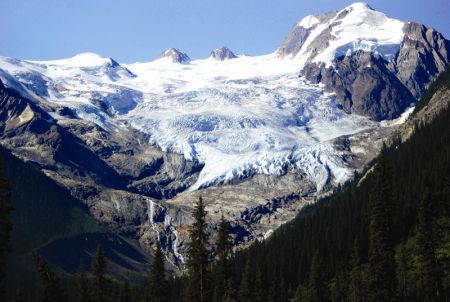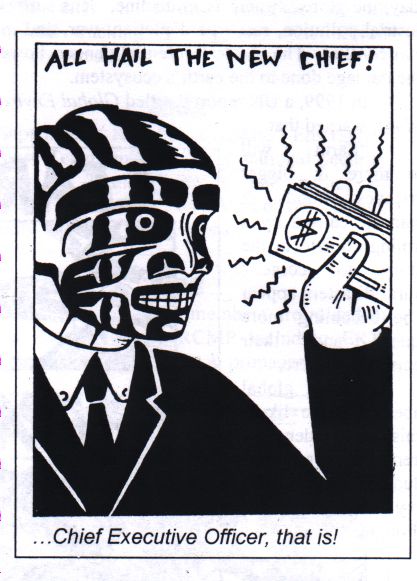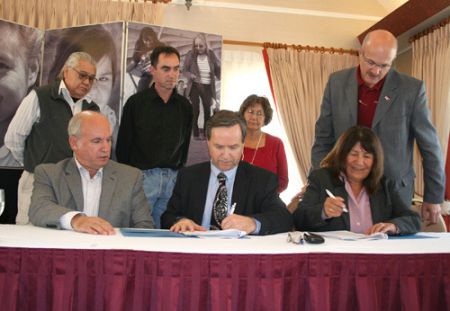STORY about EnvironmentIndigenous posted on February 5, 2011 by totalfreedom365
A Jumbo Deception: The Qat'muk Declaration
Ktunaxa Nation Council's strategy for the theft of Sinixt land and culture.
The Ktunaxa Nation council's Qat'muk Declaration at first glance looks like an assertion of Indigenous sovereignty to protect a large watershed, grizzly bears and a site of cultural signifigance from resort development but smells like a plot by native and non-native politicians to quicken the theft of traditional sovereign Sinixt territory through false land claims, first nation's management plans and the BC Treaty Process in the interests of industry, business and the dominant settler society.
Kathryn Teneese is the recently appointed Chair (Council chief) of the Ktunaxa Nation Council. Since 1996, she has also been the nation's Chief Negotiator. Teneese recently lead a delegation of Ktunaxa Nation members to the BC legislature in Victoria to declare opposition to the controversial Jumbo Glacier Resort and declared it as Ktunaxa Nation territory and as a sacred place to the Ktunaxa.
One major problem with the Qat'muk declaration is that the Jumbo Glacier is in traditional Sinixt Territory.
Stories surrounding the Kootenay and Columbia Rivers tell of an ancient Salish mother tribe (Sinixt). Through the Indian Act the Sinixt (Arrow Lakes Indian Band) were declared extinct in 1956 after the uninhabitable Oatscott Reserve was found empty. Even though hundreds if not thousands of Sinixt were elsewhere in their traditional territory, predominately south of the US/Canada border (or wherever one could take refuge from racist bounty killings, and the overall impact of disease and settler society). Today the Ktunaxa Council and BC government through the BC Treaty Process and land management palns are trying to strip the Sinixt of their traditional lands.
Nightmarish stories of landscapes and rivers scarred from mining operations, industrial logging, development, the toxic Teck smelter in Trail, BC, and nuclear reactors on the banks of the Columbia at the Hanford Site, a site fueled by the Grand Coulee Dam, the dam that ended the migration of pacific salmon to the headwaters of the Columbia and Slocan rivers and countless others. This dam and others are responsible for erasing the traditional indigenous culture from the landscape. (The Hanford Site developed the plutonium for the Atomic bombs that the USA dropped on Japan and Nagasaki in the 1940's).
Three weeks prior to the Ktunaxa council's Qat'muk declaration trek to Victoria, Kathryn Teneese  and the Ktunaxa council made a “Strategic Engagement Agreement” with the BC government receiving nearly 1.7 million dollars to further engage in the land use planning, resource extraction and treaty making over Sinixt territories. A photo of this so-called historic agreement shows Teneese with the biggest smile in the room, signing the document with the Minister of Energy, Mines, and Petroleum Resources Bill Bennett, and Pat Bell the BC Minister of Forest and Range.
and the Ktunaxa council made a “Strategic Engagement Agreement” with the BC government receiving nearly 1.7 million dollars to further engage in the land use planning, resource extraction and treaty making over Sinixt territories. A photo of this so-called historic agreement shows Teneese with the biggest smile in the room, signing the document with the Minister of Energy, Mines, and Petroleum Resources Bill Bennett, and Pat Bell the BC Minister of Forest and Range.
With millions of dollars in funding from the BC Treaty Process the Ktunaxa Council has been engaged in the land theft, cultural whitewashing, and profiting from the development of Sinixt territory for years. According to Sinixt elders, the Ktunaxa are outsiders to the area with their namesake, the Kootenays. Historical evidence suggests that the Ktunaxa traveled westward from the Plains after being chased out of occupied lands in the Rocky Mountain foothills by the Blackfoot.
The Ktunaxa council goes as far as to claim ancient Sinixt cultural sites, Sinixt legends, and the sinixt sturgeon-nose canoe as their own (kutenai canoe). Some of these claims stem from confusion surrounding family histories and the intermarriage of Sinixt and Ktunaxa families over the last 200 years but some ktunaxa people are using this confusion to further their business, political and economic interests at the expense of all Sinixt people.
There is evidence and oral history suggesting the Ktunaxa and the Sinixt battled each other over a major Sinixt fishing ground near the confluence of the Slocan and Kootenay Rivers. The Ktunaxa were considered the intruders, and the dispute was ended after the Sinixt mounted a large war-party which saw Sinixt warriors brutally defeat the Ktunaxa. After this battle the Sinixt who were suffering from the impacts of disease epidemics allowed the Ktunaxa to live on the east side of the Kootenay Lake.
The Role of Collaborator Chiefs
Canada's and BC's control over Indigenous nations has taken many forms, including police & military violence, churches, Residential Schools, & Indian Agents. Today, chiefs & councilors acting as collaborators have become a vital part of the colonial regime's ability to control indigenous peoples. Colonialism always prefers to deal with collaborator chiefs, who can more effectively control their people than can direct government agencies. This is most often done by setting up puppet governments comprised of indigenous collaborators. The state gives its full support and recognizes only them as the legitimate representatives of the nation. This strategy is known as neocolonialism.
These chiefs serve to pacify & confuse native populations, appearing to fight for 'rights & title' when in reality they are working along side the government & corporations. Many, like Ktunaxa Nation Chair Kathryn Teneese and Treaty Commissioner Sophie Pierre, are themselves politicians, businesspeople, and lawyers, who gain wealth, status and power from the colonial system. This involves acting as a legal agent (i.e., as a band council or political organization) on behalf of Native nations, legalizing the theft & exploitation of ancestral territories (in the case of the Ktunaxa... other nations ancestral territory). By helping government impose its policies & strategies on Natives, these types of collaborators aid in the assimilation of their own people.
The BC Treaty Commissioner and former Ktunaxa Nation Administrator Sophie Pierre was a strong advocate for the 2010 Olympics and encourages VANOC's Olympic vision of dealing with indigenous nations and their unceded land bases through the BC treaty process, according to the introduction by Ms. Pierre in the BCTC 2010 annual report.
Ms. Pierre was told by her own elders that when she was in the Slocan Valley she was in Sinixt territory, she stated this as she trembled at the Sinixt Nation Camp that was established to defend Sinixt burial grounds.
Pierre and the Ktunaxa Nation, have a 40-million dollar stake in the St. Eugene Mission Resort, a BC residential school turned upscale 4.5 star, 125 room resort and casino just minutes from the Cranbrook airport. Pierre is also the acting President of the holdings company that operates the resort.
Major economic interests and benefits are behind the Ktunaxa Nation council's fraudulent claims to Sinixt lands. The Ktunaxa council and its councilors are trying to make agreements and treaties with the BC government on lands they have NOT inhabited “since time immemorial” as some politicians would suggest. Traditional Sinixt families use and occupy these lands to this day with archeological evidence supporting their existence and use of these lands for over 12,000 years.
It should be stated that the Okanagan Nation Alliance are also actively engaged in trying to claim the unceded territory of the Sinixt for profit through their participation in the Indian Act Band Council system and the BC Treaty Process.
It is unfortunate that the Ktunaxa Nation council has jumped on the band-wagon to “Keep Jumbo Wild” while trying to pull the wool over the eyes of the local settler society and their own people. Their declaration against the Jumbo development holds no integrity in the context of the larger violation of indigenous sovereignty. Put simply, the Chief and Council are opportunists against Jumbo.
CANADA NOR ITS AGENTS WILL EVER ACT IN OURS OR OUR CHILDRENS BEST INTERESTS.
WE MUST DO THIS OURSELVES!
Settlers in Support of Sinixt Sovereignty
File attachments:
The site for the Vancouver local of The Media Co-op has been archived and will no longer be updated. Please visit the main Media Co-op website to learn more about the organization.



Comments
Thank you for posting this!!
People in Vancouver really need to find out what's going with this treaty business. What is profoundly disturbing is that all of us in this city indirectly benefit from this new wave of colonization. This is the funny thing about privilege: people don't just come out and admit that they have it (cf. http://video.google.com/videoplay?docid=3812249801848706206#). They always act as if they're concerned for other people's well being without admitting their own role in those people's lack of well being.
Anyway, all the best to you, and I really do wish more people in Vancouver were paying attention to this.